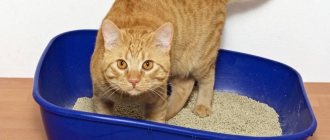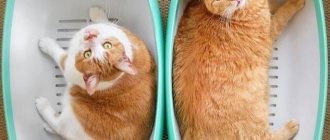Normal behavior for felines is to go to the toilet in the same place, carefully burying the “results”. This is exactly how instinct tells them to act. Left to its own devices, the cat will choose one or two secluded places as a toilet. This is why most domestic cats are easy to litter train. And even in the event of some misunderstandings, the cat is more likely to “get things done” either next to the tray, or hide it out of sight, or, conversely, demonstratively place it by the door, in the owner’s slippers or on the bed. But it will still be some kind of stable place. And if a cat shits anywhere, what should you do?
This behavior indicates serious deviations. The problem may lie in the animal's illness or psychological problems.
Reasons that caused the problem
The cause may be diseases of the genitourinary system or psychological problems. In each case, an individual approach to your pet is required.
However, we should not forget that the cat’s litter box should always be clean and tidy. The filler is selected depending on the age and length of the animal’s fur.
A healthy trained kitten always pees in the litter box
Health problems
A cat may miss the toilet due to illness. If your pet experiences pain when going to the litter box, this place begins to be associated with bad sensations. This often happens if the pet is old. The animal instinctively tries to avoid the cat litter.
The most common diseases found in cats and kittens:
- Urolithiasis disease. Pets aged 2 to 6 years who are overweight and have metabolic disorders are most at risk.
- Cystitis. Due to the weakening of the walls of the bladder and ureters, the process of going to the toilet becomes uncontrollable, and the cat feels terrible pain. Blood and pus appear in the urine.
- Rheumatoid arthritis. Reduced activity of movements, lethargy and fatigue are symptoms of arthritic pathology. The cat becomes nervous and anxious if you pick it up.
- Neurological problems. They happen as a result of stress.
Each pathology requires timely and targeted treatment.
Territory designation
Cats reach sexual maturity between six months and 8 months. This manifests itself in loud meowing, frequent mood swings and, of course, marking the territory. Animals use urine to attract an individual of the opposite sex and signal their readiness to mate. Cats scare away other males in this way, essentially saying: “This is my territory, get out of here.”
The cat marks the territory
People cannot understand why cats walk back and forth, asking people to open doors. An animal can explore its territory in an instant and then go home. In an instant, cats receive all the necessary information about life in this place. These are a kind of “checks”. Pets can conduct them several dozen times a day, because “tags” are a short-lived source of information. It needs to be constantly updated so as not to worry about the territory.
Interesting fact! Doors are the most hated enemies of domestic cats, because obstacles make it difficult to inspect the territory.
Hormonal pathologies
The main glands for secreting hormones are the thyroid gland, pituitary gland and adrenal glands. They promote body growth, milk secretion, affect metabolism, and stimulate the production of germ cells.
If a hormonal imbalance occurs, the disease makes itself felt through the genitals and hair. The pet's activity, general condition, and skin deteriorate. Because of the discomfort they experience, cats begin to pee past the litter box.
Diseases that occur as a result of hormonal imbalances:
- diabetes of various types;
- obesity;
- autoimmune diseases;
- hypocalcemia – lack of calcium in the body;
- hypercalcemia – excess calcium in the body;
- hypoparathyroidism – insufficient secretion of parahormone.
These pathologies cause serious problems in the body of cats, some lead to the fact that the cat begins to urinate anywhere.
Psychological problems
Pets may pee in the litter box due to psychological disorders. Cats have various types of neuroses and frequent stressful situations. If a cat frequently licks itself, twitches its tail and generally behaves nervously, this is a sure sign of a problem, the cause of which must be urgently eliminated.
The litter is not suitable for the cat
It is recommended to be very responsible when choosing the composition for the tray. If the animal does not like the filler, then it needs to be changed in the next 2 days. Otherwise, the cat will completely stop going to the place intended for the toilet.
The following factors can scare off a cat:
- Synthetic odors can simply be unpleasant to your pet for no reason.
- Dust clouds when digging. An allergic reaction occurs, as a result of which the cat's eyes water and he begins to sneeze.
- Filler hissing. This can be very frightening and stressful if the cat is impressionable.
- The tray is inconvenient. It may simply be difficult for a cat to climb over the sides if there are problems with the locomotor system. The solution is to buy a cat litter box with an entrance.
It is important to listen to your pet's opinion. When he likes the filling base for the toilet, the owner will immediately understand it.
Important! Do not forget about the rules of hygiene - you need to wash the tray and change the filler at least once a week.
State of stress
Veterinarians have recognized that stress conditions exist in cats too. The animal's nervous system instantly reacts to stimuli. Stress depends directly on the actions of the owner. The causative agent can be cutting nails, taking a bath, or changing the environment. If your cat’s breathing, pulse, or blood pressure increase, then you need to quickly identify the irritant and eliminate the cause of the stressful condition.
Another reason is lack of attention and affection. Due to the lack of proper love, the cat may simply become offended. If the owner has ever hit or shouted at his pet, then the cat pisses out of revenge.
Tray position is incorrect
Cats may reject a litter box if it is close to food. Since animals navigate by smell, a sudden change of location can also become a factor in hostility towards the litter box. For cats, such changes are very significant, so you should not move the litter box unnecessarily.
What to do if your cat has urinary incontinence?
Sometimes urinary incontinence occurs as a postpartum complication. The pathology resolves spontaneously. In all other situations, if incontinence is suspected, the cat is sent to the clinic for examination.
The veterinarian conducts an examination, takes blood for analysis, performs an ultrasound, makes a diagnosis and prescribes treatment. If surgery is indicated, it is performed in a clinic, and postoperative care is provided by the animal owner at home. If conservative treatment is required, follow the procedures prescribed by the veterinarian.
With urolithiasis, situations arise when it is necessary to insert a catheter to drain urine. If your cat is diagnosed with diabetes, you will need insulin therapy and a special diet that is low in carbohydrates and high in protein and fat.
How to stop a cat from walking past the toilet
If puddles constantly appear in different corners of the apartment and this is not associated with illness or acute stress conditions, then the cat needs to be weaned from walking past the litter box. What to do if your cat starts peeing anywhere. The most important thing is to be patient and follow the instructions.
Preliminary advice
How to stop a cat from peeing on the sofa: what to do
These recommendations will help carry out the weaning procedure painlessly for the owner and his cat:
- Under no circumstances should you shout at a cat caught doing a thankless task.
- Don't poke your nose into the puddle, much less hit. This will only make the situation worse and cause even more stress.
- Do not interrupt the process with brute force - the animal will not understand why it was stopped. As a gift, he can harbor a grudge and shit with redoubled force out of revenge.
Healthy! If it turns out that the cat is peeing in the wrong place, you need to pour some warm water on its head.
Steps to stop your cat from peeing near the toilet
The first and main step to stop a cat peeing anywhere is daily wet cleaning of the apartment. Keeping the room clean will eliminate odors that can cause cats to pee in inappropriate places.
The second step concerns the tray. In the store you need to choose a spacious and high tray - the cat will feel safe in it. The filling base must be changed regularly. The best option is once every 2-3 days, but at least once a week. If this is not done, the pet will smell unpleasant odors and will avoid the “fragrant” place. Also, you should not place the tray next to the place where food is eaten - this will cause unpleasant associations for the animal.
Closed tray with entrance
Third step. You need to use special sprays. They will affect the nervous system of cats in a certain way and will help to wean them from walking past the litter box. These drugs are safe and effective several times more than punishment and screaming.
The answer to the question of what to do if a cat pees everywhere and begins to “mark territory” during the mating season is somewhat more complicated. No medicine or psychological influence will help. Only sterilization or castration can help. If you plan to breed kittens, then you need to wait out the hormonal period. In this case, castration is not an option.
Advice! Cleaning the area of a puddle with bleach is ineffective, and red pepper can cause burns. The best option is to cover the floor in the apartment with double-sided tape.
Physical punishment
Cats are against violence in any form. Any form of physical violence and even pulling by the scruff of the neck is behavior that is unacceptable in the eyes of a cat. As for the latter, for an adult cat, being pulled by the scruff of the neck is a real insult.
Every owner of a furry pet should understand once and for all: it is impossible to raise this animal by screaming and poking its face at the floor. All you will achieve is the end of friendship and long-lasting resentment. The cat may begin to fear his former friend and will definitely lose respect for him.
Sprays to stop a cat from walking past the litter box
The cat shits: what to do if the cat goes to the toilet anywhere
Quite a few pet owners use repellent scents. The drugs stop you from writing in the wrong places.
Repellent spray
Spray “Mr.Fresh weaning off shitting”
This product will effectively help stop cats from crapping. The action is manifested in the following features:
- eliminating unpleasant odors;
- adjusting your pet's behavior;
- completely weaned from walking past the toilet.
Includes:
- Methyl nonyl ketone. It has a deterrent effect without causing discomfort to people.
- Perfume scent "Orange". Gives a pleasant aroma and completely neutralizes unpleasant odors.
- Sagebrush. Has an unpleasant taste, helps to scare the cat away from a secluded corner to pee.
Directions for use: shake the bottle and apply to the area of interest to the cat from a distance of 30 cm. Repeat the procedure 2 times a day.
Volume: 200 milliliters.
Price: 200 rubles.
Means with a repellent odor “Ms Kiss for weaning off shitting”
The spray is suitable for all surfaces and has no color. The product is used to wean cats from shitting in inappropriate places and from marking their territory. Use once a day. Valid for 3 days, can be applied to any surface.
Ingredients: water, solvents, fragrance, preservatives, emulsifier, dinatonium benzoate.
Volume: 200 milliliters.
Price: 140 rubles.
Important! The effectiveness of sprays depends on the frequency and selection of the correct location for use. Patience and an integrated approach will solve the problem of cats peeing in the wrong places.
Cystitis
The most common and hard-to-treat disease in cats is cystitis, an inflammation of the mucous membrane of the bladder. This disease can be provoked by eating low-quality, cheap food, as well as various infections and the formation of kidney stones. It is also unsafe for owners to have close contact with sick animals, as there is a high risk of infection. Initially, the disease is almost impossible to recognize, only over time the symptoms become more obvious. Cystitis is divided into two types: acute and chronic. Chronic cystitis most often occurs in older cats. Acute develops into chronic, and if your cat is not treated in time, purulent processes may occur that can lead to peritonitis.
Folk remedies for weaning cats from shitting anywhere
Why does a cat walk past the litter box: the main reasons and what to do
These products repel cats so that they don’t piss anywhere:
- Cats cannot tolerate citrus fruits. In the place where your pet wants to shit, you need to lay out the peel of an orange, lemon or grapefruit.
- Cats hate hot vegetables. If you rub a paste of onion or garlic onto your pet’s “favorite” surface, the cat will no longer appear there.
- Perfume products. Not a very effective method, because... Purely individual, but worth a try.
- Essential oils. Extracts of rosemary, lavender, mint are mixed with water, citrus peel is rubbed into the solution and dripped onto the place where the cat pees.
- Vinegar and alcohol. Cats do not tolerate the smell of alcohol and vinegar. One small glass of alcoholic beverages on the table will give an absolute guarantee that the pet will not climb on it and will not commit its dirty deeds.
The listed compositions have good and time-proven effectiveness. They will discourage any desire to write in the wrong place.
Possible diseases
There are several diseases, a symptom of which may be that the cat pees very often and little. These are diseases of the genitourinary system. Some of them can be very insidious. What disease your cat has can be determined, of course, only by a veterinarian after examination and passing all the necessary tests. It is strongly not recommended to engage in treatment or give any medications on your own without a doctor’s prescription, without even knowing what happened to your cat. Your pet may only get worse and you will waste time.
Re-education of kittens
Raising a new pet should begin from a very young age. If you do not teach a kitten to go to the litter box as a child, then retraining an adult will be extremely problematic, and professional help may be required.
During litter training, you need to treat the kitten kindly
As soon as a kitten appears in the house and goes to the toilet on the floor, it cannot be scolded. It is necessary to thoroughly wipe the area of the puddle so that no traces of the unpleasant specific odor remain. Here you need to install the first tray, which will not be difficult to climb into.
The next time the animal starts to worry and look for a secluded corner to relieve itself. We need to help him. Carefully pick him up and take him to the place where the tray is located. Pet and calm the animal so that it does not feel afraid. If you use the right re-education methods at an early age, there will be no toilet problems in the future.
Helpful advice! In the first few days of training, it is not recommended to wash the tray; it is better to tolerate unpleasant odors. The kitten will be able to find its toilet faster.
If a small pet went to the litter box once and went to poop near the door or found another secluded corner, then he needs to buy a second cat litter box. It often happens with cats that they cannot do both in one place. You shouldn’t scold them for this, just put a new tray where your pet goes for other things.
It is very important to encourage a little kitten when he goes to his toilet instead of on the floor. You need to play with the animal, pet it and simply verbally thank it - they feel a kind tone and understand what is wanted from them.
Training your pet to go to the toilet is not difficult if you do it from childhood. In adulthood, retraining will take a lot of time and effort from the owner. Retraining methods are generally similar, but it is worth remembering that each cat requires an individual approach. You can’t expose cats to stress, beat them or yell at them for misdeeds. Love, affection and patience will help you overcome all difficulties.
Adult animal
Why does an adult pet defecate anywhere? The most common reasons are hormonal imbalances or poor health.
Retraining an adult cat to walk in the right place is much more difficult than training a kitten to use the litter box. You will have to put things aside for a while and start raising the animal:
- You will need to purchase a new tray for your animal. It should be large, preferably closed. Cats respect privacy and therefore always look for a closed place to go to the toilet. You can also buy a good spray that will repel pets, preventing them from defecating anywhere;
- If the cat begins to mark all the places, repellent type sprays will be a great help. The smells of eucalyptus, citrus, mint or tea help in this regard;
- Some owners believe that cats are scared by the smell of bleach. Chlorine-containing products smell unpleasant, but you can get used to it;
- If you don't have a spray on hand, you can use an air freshener. A warming ointment, “Star” balm, can also help. Use such products rarely, as they can harm the animal.
If you notice that your kind cat has started peeing everywhere, then most likely she is experiencing real stress. The animal may be worried about a lack of communication and love.
Treatment
If your cat frequently pees blood, do not treat it yourself. After examination and tests, the doctor will prescribe the necessary treatment for your pet. Usually it necessarily includes antibiotics, painkillers, vitamin K1, and when the body is dehydrated, glucose or saline is introduced. If stones need to be removed, then surgery is required. To prevent the occurrence of this disease, as with cystitis, you need to monitor your cat's diet. You should also not let her go outside to avoid contact with infected animals. Don't forget to give her deworming medicine regularly.
Veterinarian advice
When treatment is completed and your pet’s illness is behind you, it is important to remember that if you do not follow the rules of caring for it, a relapse may occur, and the disease will begin to progress with renewed vigor. This is especially true for cystitis.
Veterinarians recommend following preventive measures to prevent these difficult-to-treat diseases. The main thing is to feed your pets with high-quality food and provide them with the healthiest nutrition possible. If you want your cat to be healthy and energetic, then under no circumstances should you feed her cheap food. It contains chemicals that have absolutely no beneficial properties, but can only cause harm and lead to the occurrence of such serious diseases that will be very difficult to cure later. Do not allow a cat who has had an illness to sleep in the cold and become hypothermic. You need to make sure your cat drinks enough clean water. Also, in order to avoid contracting various infections, veterinarians advise that their pets be vaccinated. And if your cat has been diagnosed with one of these diseases, then periodically, for insurance, show it to a specialist. After all, you see, it’s easier to adhere to these precautions than to endanger the health and life of your beloved animal.











